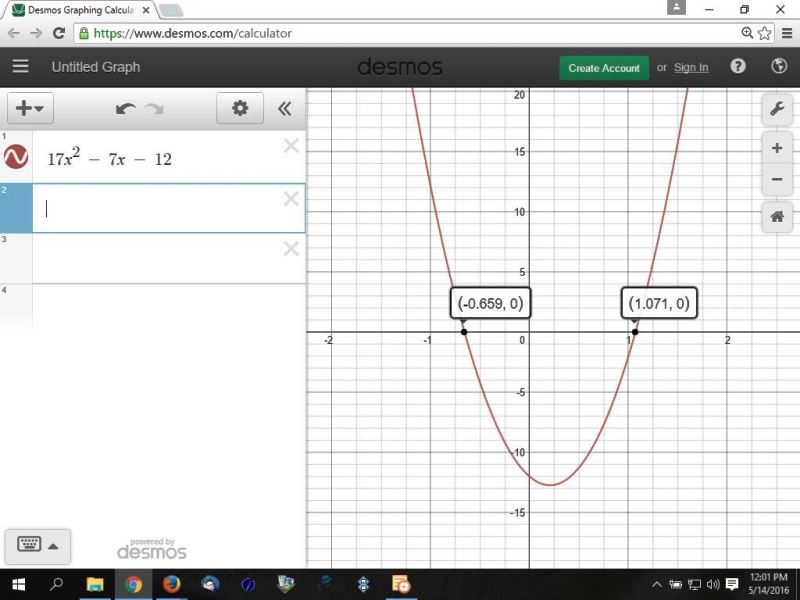SOLUTION: The sum of the reciprocals of two consecutive positive numbers is 17/12. Find the numbers.
Algebra.Com
Question 1034425: The sum of the reciprocals of two consecutive positive numbers is 17/12. Find the numbers.
Found 3 solutions by stanbon, Theo, ikleyn:
Answer by stanbon(75887) (Show Source): You can put this solution on YOUR website!
The sum of the reciprocals of two consecutive positive numbers is 17/12. Find the numbers.
-----
Integers:: x ; x+1
---
Reciprocals:: 1/x ; 1/(x+1)
-----
Equation:
1/x + 1/(x+1) = 17/12
--------
12(x+1) + 12x = 17x(x+1)
-----------------------------
24x + 12 = 17x^2 + 17x
17x^2 - 7x - 12 = 0
------
x =1.07... (That is not an integer; please check your post)
----
Cheers,
Stan H.
-------------
Answer by Theo(13342) (Show Source): You can put this solution on YOUR website!
let the first positive number equal x.
then the second positive number equals x+1.
the sum of the reciprocals of those numbers is equal to 17/12.
you get 1/x + 1/(x+1) = 17/12.
multiply both sides of this equation by x * (x+1) to get:
(x+1) + x = 17/12 * (x+1) * x
simplify to get 2x + 1 = 17/12 * (x^2 + x)
multiply both sides of this equaiton by 12 to get:
12 * (2x + 1) = 17 * (x^2 + x)
simplify to get 24x + 12 = 17x^2 + 17x
subtract the left side of the equation from both sides of the equaiton to get:
0 = 17x^2 + 17x - 24x - 12.
simplify to get 0 = 17x^2 - 7x - 12.
this is the same as 17x^2 - 7x - 12 = 0.
solve this quadratic equation using the quadratic formula to get:
x = (7 + sqrt(865))/34 or x = (7 - sqrt(865))/34
this results in x = 1.070908304 or x = -.6591435982.
x can't be negative, so x has to be equal to 1.070908304.
this makes x + 1 = 2.070908304.
if you did this correctly, you will get 1/1.070908304 + 1/2.070908304 = 17/12.
evaluate the left side of this equation to get 1.416666667 = 17/12.
multiply both sides of this equation by 12 to get 17 = 17.
this confirms the solution is correct.
your positive consecutive numbers are 1.070908304 and 2.070908304.
these are the same as (7+sqrt(865))/34 and 1 + (7 + sqrt(865))/34.
1 + (7 + sqrt(865))/34 can also be written as (41+sqrt(865))/34.
you can solve the quadratic equation graphically as well.
i used the quadratic formula to get an exact answer.
the graphing software i used gave me an approximate answer.
that graph is shown below:

Answer by ikleyn(52781) (Show Source): You can put this solution on YOUR website!
.
The formulation of the problem is INCORRECT since the solutions are not integer numbers.
RELATED QUESTIONS
The sum of reciprocals of two consecutive even numbers is 5/12,find the numbers. (answered by htmentor)
The sum of the reciprocalsFind the numbers. of two consecutive positive numbers is 17\12. (answered by ikleyn)
The sum of the reciprocals of two consecutive positive number is 17/72. Find the number. (answered by josgarithmetic)
The sum of the reciprocals of two consecutive even numbers is 7/24. Find the... (answered by AnlytcPhil)
The sum of the reciprocals of two consecutive odd numbers is 8/15. Find the numbers. (answered by MathLover1)
Two positive numbers differ by 4. If the sum of their reciprocals is 2/3, find these two... (answered by ben720)
If the product of two positive numbers is 8 and their sum is 6, find the sum of their... (answered by jhunjiro)
If the product of two positive numbers is 8 and their sum is 6, find the sum of their... (answered by LinnW)
the difference of the reciprocals of two consecutive odd numbers is 1/84. find the... (answered by edjones,lwsshak3,Northwestern2015)
